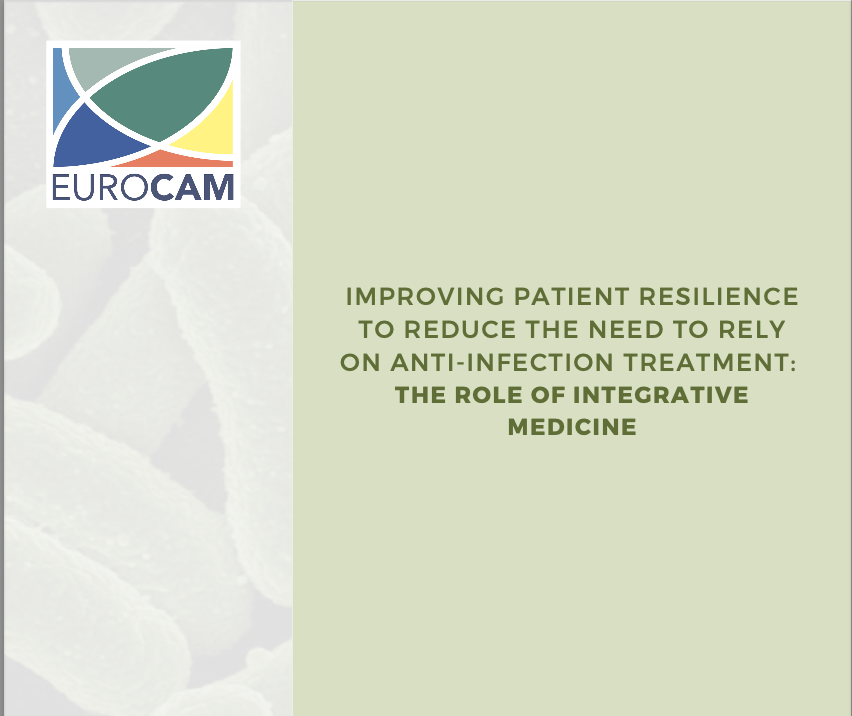‘Improving patient resilience to reduce the need to rely on anti-infection treatment: the role of Integrative Medicine’
Infectious illness is the result of two factors: the susceptibility of the patient and the presence-exposure to infectious agents. The susceptibility of the patient is an aspect that receives little research attention but in relation to AMR has a vast potential to improve matters.
There is no question that antibiotics have dramatically and successfully reduced illness and death from serious infectious diseases. However, the extensive use of antibiotics has also resulted in immense problems. Antimicrobial resistance (AMR) – the resistance of bacteria, parasites, viruses, and fungi to antimicrobial drugs previously effective for treating the infections they caused – is now a serious worldwide threat to public health.
The current treatment of infections is focused on killing germs because they are perceived as the cause of the infection. However, the body becomes susceptible to infectious agents only if the internal balance – or homeostasis – is disturbed. After all, there are billions of microbes and bacteria inhabiting our gut, our blood, in fact, our whole system, most of which are essential to good health. Pathological bacteria, fungi, and viruses take root as a disease when the terrain is weakened and susceptible. This phenomenon explains why when a bacterial or viral agent is "doing the rounds," some people become sick while others remain healthy.
Infection is always the result of two factors: exposure to a pathogen and the person's susceptibility. There is no argument that antibiotics can save lives in a seriously ill patient affected by highly virulent bacteria. In other cases, it is the patient's susceptibility that needs to be addressed. Susceptibility means a weakened immune system.
This current approach which focuses only on the infecting organism is also reflected in research, which has been directed at finding the most potent way to kill the germs. The vital role of the host's ability to repel invaders based on a properly functioning immune system has been neglected. Hardly any study investigates ways and means to raise the immune system's effectiveness, in other words, how to improve the resilience of the citizens as a means of tackling AMR.
Current medical research is typically interested in the way disease processes develop and focuses on improving ways to fight disease with the aid of ever more potent drugs. Host factors are hardly addressed. Medical research should shift its focus if we want to establish a health-oriented healthcare system. There is a fundamental difference between science that studies diseases and science that studies health: the questions, hypotheses, methods and answers, and conclusions will be different. For instance, research into the mechanisms and factors of how smoking may lead to lung cancer is very different from the research that tries to find out why many smokers do not get lung cancer.
The concept of positive health, also called salutogenesis, focuses on how and why people stay well. On understanding the resilience factors that protect an individual from developing physical and emotional illness in the face of stress and other pathogenic factors. Within this context, it is essential to understand that most complementary and integrative medicine interventions support the host's adaptive coping mechanisms rather than addressing specific diseases and dealing with impersonal risk factors. Their beneficial effects on the health and resilience of populations (including humans, animals, and plants) will, for instance, also reduce the dependence on antibiotics. So, we also plead for more research investment in complementary and integrative medicine interventions.
It is essential that research is especially focused on exploring the role of resilience, i.e., the effects of diet with organic food (for humans and animals), exercise, age, psychological stress, and other factors on the immune response, both in animals and in humans. The role of resilience in organic farming needs exploration likewise. Research needs collaboration across specialisations and professions, including those focusing on different species (humans, animals, and plants), thus providing a solid foundation for tackling AMR from a One Health perspective.
A first piece of research was presented at our conference "Reducing the need for antibiotics - The contribution of Complementary and Alternative Medicine" in 2018 by a network of academic researchers. They demonstrated the preliminary evidence for the effectiveness of Complementary and Integrative treatment options in respiratory tract infections. Their work was funded by the JPIAMR - Joint Programme Initiative on AMR. The network has recently been extended and again received funding from JPIAMR.

